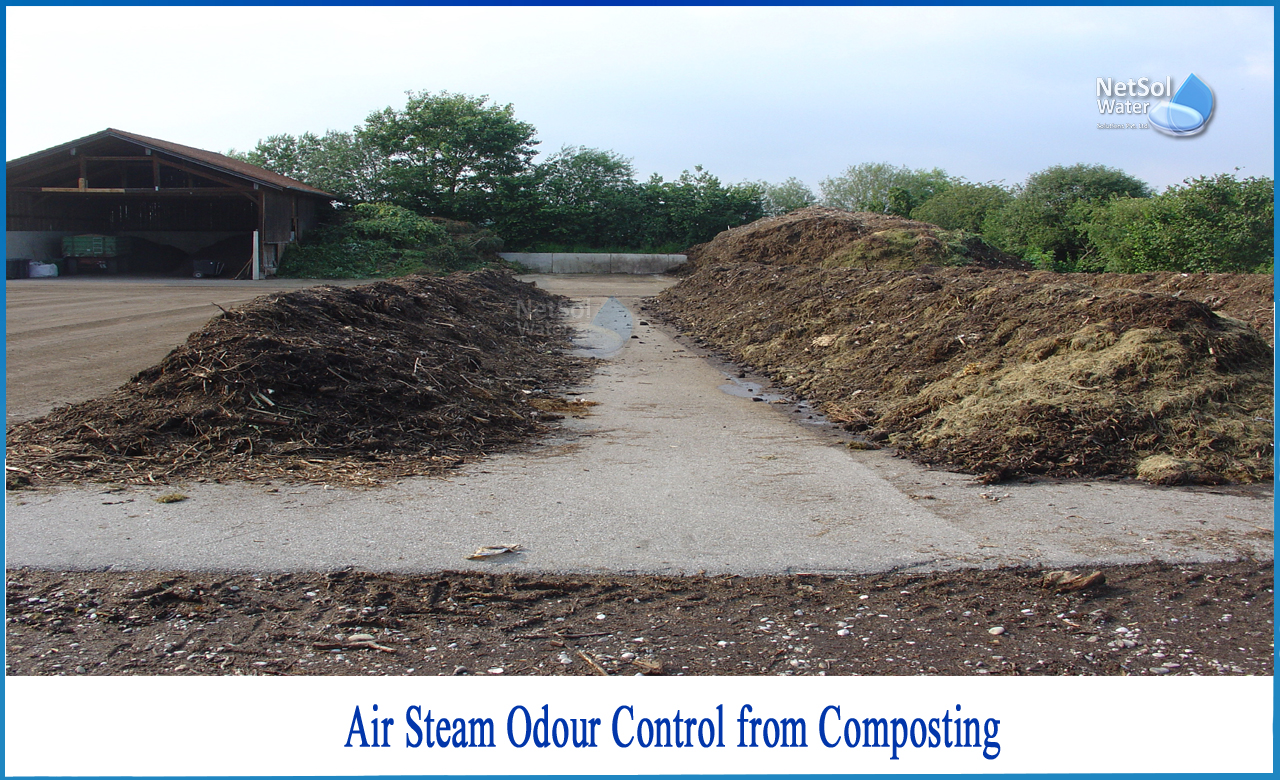How to Air steam Odour control from Composting?
To successfully regulate odours, it is vital to grasp the principles of their creation and emission, as well as the path of element transfer and transformation. As a result, related steps to minimize emissions can be implemented at the source, process, or end.
Composting causes the production of odours
Odours are gaseous compounds that are released into the atmosphere from a number of sources. Many people find methyl salicylate to be pleasant. Others, such as skatole are less well tolerated. At varying degrees of concentration in the air, these gases may be detected by the human nose. Some of these compounds are detectable even at extremely low quantities.
Management of odours during composting
The above-mentioned ‘N’ transport and transformation processes indicates the mechanism for suppressing NH3 release:
(1) Decreasing organic nitrogen mineralization, which may influence compost mineralization and maturation.
(2) Increasing the NH4+ to NH3 ratio (lowering the pH); nevertheless, the range for this adjustment is limited.
(3) Facilitating NH4+/NH3 assimilation (promoting related microorganisms).
(4) Increasing NH3 oxidation (promoting related microorganisms and oxygen supply).
Similarly, the process of sulfide generation implies that raising the ORP might minimize VSC emissions. Adding thermodynamically favourable electron acceptor chemicals is a popular approach for boosting the ORP. Many oxidants can have similar effects. Furthermore, reducing SRB development and increasing pH can minimize sulfide production.
Composting conditions must be adjusted
Composting conditions change have an effect on odour generation and emissions. Composting must meet a number of parameters in order to be successful. Basic parameters like as O2, pH, and temperature should be within acceptable limits. If composting can keep these parameters within a suitable range, the most simple and feasible control strategies are appropriate changes to limit smell emissions.
The element oxygen (O2)
O2 content should have a significant impact on the development of smells during composting. In terms of NH3, an increase in oxygen concentration should improve NH3 oxidation, hence limiting itsrelease.VSCs are emitted primarily as a result of inadequate oxygen delivery, and O2 feedback management might limit VSC output.
pH
The pH of the compost varies as it decomposes. The early step of composting results in a fall in pH due to the release of organic acids. Following that, the organic acid is degraded further, and various sulphur-containing compounds are destroyed to create a particular quantity of S2, which is released after being coupled with H+, lowering the H+ concentration in the reactor and increasing the reactor pH.
Microbial agents
Some adsorbents may have an impact on the composting microbial population. This can also help to minimize the production of odours. The inclusion of microbial agents or inhibitors of the target microorganism metabolic activities will have a more direct influence on controlling the microbial community.
Adsorbents
Adsorbents having a porous structure and a large surface area, whether natural or manufactured, may absorb large amounts of odours created in compost. At the end of composting, some adsorbents can be efficiently recycled and reused. The most common adsorbents are zeolite, charcoal, woody peat, and medicinal stone.
Agents of chemical nature
Odours can be eliminated by adding chemical agents to the compost matrix and allowing chemical processes to take place. To remove NH3 from wastewater, ferric chloride (FeCl3) has been frequently employed. Iron salt has also been used as a pre-treatment in anaerobic digestion to suppress VSCs. Although there aren't many irons salt uses in composting, some research has shown that utilizing FeCl3 to reduce odours in composting is practical.
What can Netsol Water provide?
Netsol Water is a significant water and wastewater treatment firm in India, offering WTP, WWTP, STP, and ETP manufacture, among other services. The company creates equipment’s and is committed to providing practical solutions that help businesses flourish.
Netsol Water is Greater Noida-based leading water & wastewater treatment plant manufacturer. We are industry's most demanding company based on client review and work quality. We are known as best commercial RO plant manufacturers, industrial RO plant manufacturer, sewage treatment plant manufacturer, Water Softener Plant Manufacturers and effluent treatment plant manufacturers. Apart from this 24x7 customer support is our USP. Call on +91-9650608473, or write us at enquiry@netsolwater.com for any support, inquiry or product-purchase related query.



